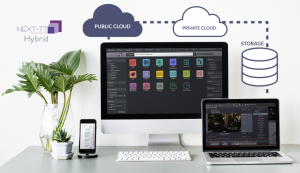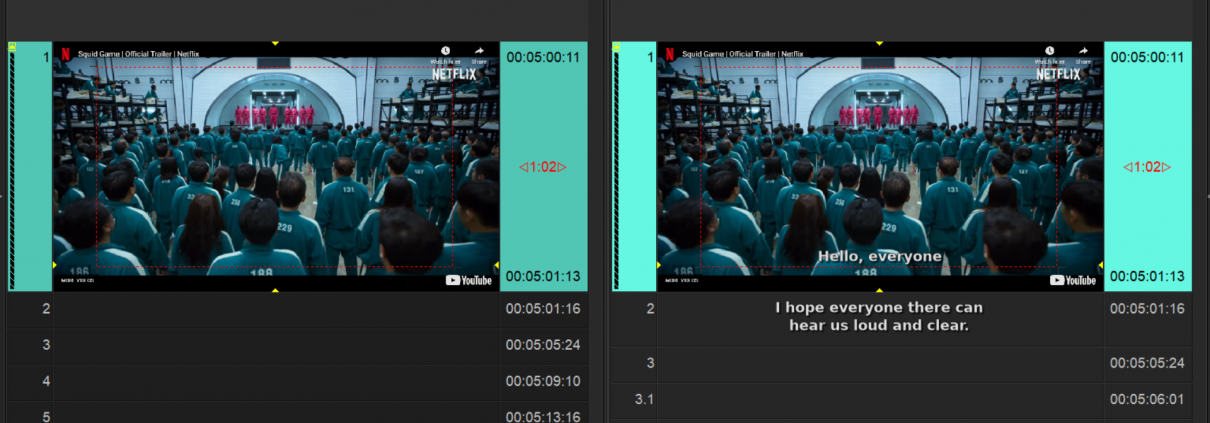Subtitling enriches the best of both worlds of Noise and Silence
We live in a world of noise. We experience busy cities, bustling towns, crowded service stations, hectic roads, airports, and shopping malls. Loud announcements, traffic, road repairs and planes flying by, all bombard our air space with decibels that drown out what we might be trying to listen to or watch on screen at the time. Even at airports or railway stations, for example, schedule announcements are constantly interrupting our concentration. Wherever we are, be it at home, or on the road, we are regularly faced with visuals that seem to scream at us vociferously – from large giant plasma screens, bright flashing digital signage ads through to our own home televisions, laptops, or mobile phone screens.
Whether we are able to hear or have impaired hearing, we can find ourselves in blaring environments that make it very difficult and challenging to hear a news broadcast we might be playing that we need to concentrate on, or a message we want to hear on our phone. The solution is clear – we simply just need to switch on the subtitles in our preferred language, and they immediately allow us to step into a new world of clarity.
Subtitles play a hugely important role in making us feel included in all situations and help us to still take part despite the clamour around us. Whether we are watching a news broadcast on a public TV screen with a lot of background noise or trying to watch a movie on our laptop in a busy airport lounge or as a hearing-impaired person attending a conference or watching a movie at the cinema or a play at the theatre, subtitles help to bridge the communication gap and welcome everyone in to the circle of communication.
Following new regulations for broadcasters that require AV content to be made accessible to everyone, including hearing-impaired people, subtitling is finally being recognised as essential, making subtitles a valuable asset to programme makers.

Imagine being in a world where your sense of hearing has completely gone, and a wall of silence surrounds you wherever you go. It can be a lonely, isolating, and frightening place if you are not able to sense what is being communicated in a public space and if you feel cut off from everything. In this scenario, it is important that everyone is included and has access to public messages in public places, as well as being able to access news, plays, movies and television programmes, just as much as everyone else can and this can be achieved via subtitling options.
Hearing loss is an extremely important subject. The more it is brought to the forefront of debates, even if awareness is raised in the form of a sci-fi movie, for example, the better society will learn to take great care of those who struggle with their hearing. To raise awareness of the experiences that our hearing-impaired friends and loved ones endure is vital.
Owing to the disruptive chaos caused by the health crisis, it is a positive move in media to see more stories focusing on marginalised groups and demographics within the mainstream.
Empathy can be evoked, and perceptions can be changed by more nuanced cinematic depictions of what deaf people have to live with. Recent films that touch on this well include Todd Haynes’ Wonderstruck (2017) and Darius Marder’s Sound of Metal (2019). In addition, Coda is another movie worth mentioning and is this year’s most anticipated drama release about a deaf family that live and work on the Eastern Coast of the United States. John Krasinski’s directorial debut, A Quiet Place (2018) has proven to be a great success for the deaf and hard of hearing community with deaf co-star Millicent Simmonds and the film’s use of American Sign Language throughout. This engaging thriller glances into a world where silence is golden, and where sound brings grave danger in a post-apocalyptic America, where the characters have to move in absolute silence to avoid alerting a mysterious pack of creatures that have intense levels of hearing.
Sound and silence become personified as characters in the film, helping to build up the tension, with the camera enabling the viewer to see a different perspective and to hear the world through the ears of the protagonist. These scenes powerfully help to shine a spotlight on the personal struggles people with hearing loss have to cope with. The scenes portray the sheer courage required to navigate through a silent world and depict the very real challenges that hearing loss can present to people in multiple situations.
These excellent films have brought the issue out in the open, giving deaf people the visibility they deserve. Hopefully these brilliant movies will inspire more filmmakers to look to the deaf and hard of hearing community in creative ways and to use subtitling to be more inclusive to everyone including those who speak different languages.
Filmmakers and broadcasters can benefit from subtitling software that provides them with flexibility so they can enjoy a seamless in-house network to share live output across multiple different production teams on a global scale. With reliable and affordable software systems on the market, subtitling is not burdensome or expensive.
SubtitleNEXT is a very popular and affordable system that is used for captioning live events and offline content in real time. It can stream content in multiple formats that are suitable for linear broadcasting, including VOD platforms and social media platforms. Defined as an exceptionally dependable subtitling software platform, it is no surprise as to why SubtitleNEXT is referred to by many professionals today as the “subtitler’s lifesaver.” Delivering to high industry standards, the system has an array of immediate resourceful tools and features.

The SubtitleNEXT subtitling platform provides subtitling professionals with many toolsets that can significantly enhance their work, one example being the “live dictation” function which can be used in live subtitling workflows in order to caption news and events in real time which is quite an exciting new development. Many more exciting features have been released and more are on the horizon for 2021. The team at SubtitleNEXT support hearing impaired charities and have a great interest at making their lives easier by supporting Bulgaria’s Listen Up organisation which champions their cause to be heard.
SubtitleNEXT already has a proven track record of success. Throughout the entire pandemic, it has continued to support customers, owing to its flexibility and remote capabilities. Many of the companies that have already adopted SubtitleNEXT include Polsat, Kino Polska, OiV in Croatia, Listen Up in Bulgaria, AMC in Hungary, Hayat, HD Media, OBN, University of Warsaw, University of Rome Tor Vergata, Doli Media Studio and The European School of Translation. Others include Europe’s largest Belgium-based production company Videohouse where SubtitleNEXT was used for well-known TV series such as Big Little Lies, Sirens, Vikings, and others.
SubtitleNEXT user, Veronique Denis creates accessible audio-visual content for the hearing and visually impaired and is an accessibility professional and specialist in real-time subtitling and Co-founder of Max Live Media Access Services in Belgium. She shares, “We strongly believe in media accessibility and in the fact that if you open up content for a smaller group, such as people with hearing impairment, there’s always a much larger group that can benefit from it as well. Think of the mother rocking her baby to sleep while watching a video or a neurodivergent person who gets overwhelmed at a busy railway station trying to obtain information. With today’s technological possibilities, which SubtitleNEXT showcases perfectly, not providing subtitling is almost equal to actively choosing to exclude a part of society. Luckily, over the last few years, awareness for inclusive media has increased and subtitles are now often expected as a standard service. This may be challenging for broadcasters wanting to meet accessibility standards and who want their content subtitled on different platforms. SubtitleNEXT enables us to meet broadcasters’ demands and high standards by being our one stop shop for all of our subtitling needs: live, semi-live or pre-recorded, the result is always of high quality.”

Veronique Denis, Co-founder,Max Live Media Access Services
Sonya Chakarova who is the Sales and Marketing Director at Pro Systems adds, “We are impressed with PBT EU’s refreshing approach and their impact in the broadcast sector with SubtitleNEXT. This remarkable software platform is playing a relevant role, not only in exceptionally constructive and helpful areas such as advancing accessibility for the hearing-impaired, but also in helping to improve communication and boost subtitling creativity in the broadcasting, media, and creative industries with a viable and affordable solution.”
Sonya Chakarova, Sales and Marketing Director, Pro Systems
Visit www.SubtitleNEXT.com for further updates.











